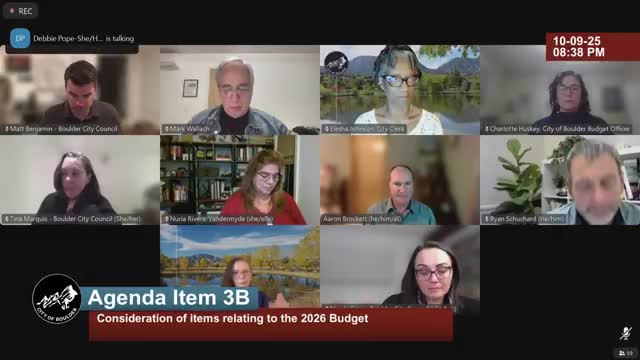Emergency Family Assistance says food‑bank demand is surging; requests city support
Get AI-powered insights, summaries, and transcripts
Subscribe
Summary
Emergency Family Assistance (EFA) told Boulder council on Oct. 9 that food‑bank visits and food pounds distributed have risen and that partner budgets are facing cuts. EFA asked the city to consider additional funding to avoid service shortfalls as federal SNAP reductions and partner budget constraints increase demand.
Debbie Pope, executive director of Emergency Family Assistance (EFA), told the Boulder City Council during the Oct. 9 budget public hearing that the organization is facing sharply rising food‑bank demand and looming supply reductions from partner organizations.
Data cited: Pope said that since January EFA served more than 2,000 households and nearly 15,000 visits, distributing nearly 1,000,000 pounds of food. She told council the organization recorded some of its busiest days in the previous week and that partner agencies that supply roughly half of EFA’s food face budget cuts of up to 30 percent — a change that could reduce available food even as demand is expected to increase 20–35 percent.
What EFA asked the council to consider: EFA committed its own additional funds (Pope said EFA will purchase additional fresh produce, dairy, eggs and culturally relevant staples) and asked the city to consider an allocation to support food purchases during the coming months. Pope said EFA is pursuing store pickup agreements, donor engagement and grant applications, but that private and government funding gaps threaten the organization’s ability to meet rising need.
Council response and context: Council members thanked Pope and said they would continue to explore budget avenues. Housing and Human Services staff reiterated that their recommended budget maintains existing EFA support levels but noted the city’s overall constrained fiscal situation. Councilors encouraged philanthropic support and cross‑sector coordination in the short term while the city considers budget trade‑offs for 2026.
Next steps: EFA asked the council to consider additional funding; staff will continue budget work and coordination with county and nonprofit partners as part of the Oct. 23 follow‑up hearings.
